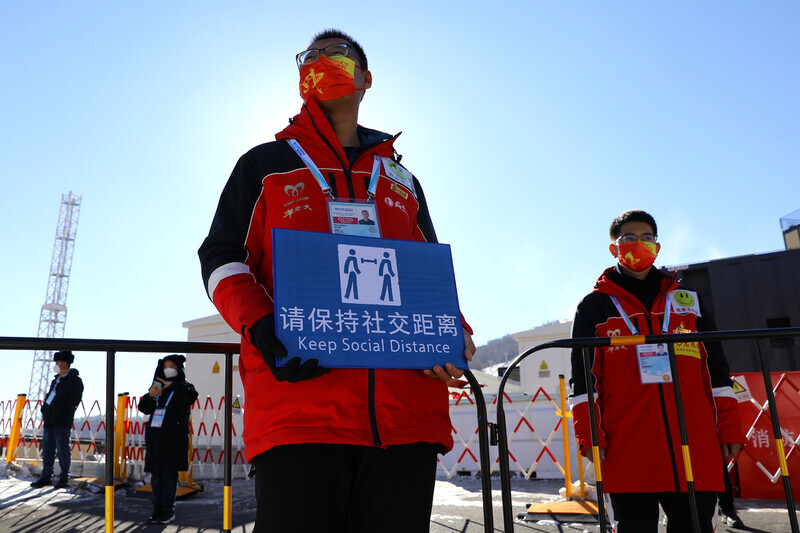hankyoreh
Links to other country sites 다른 나라 사이트 링크
Will the Beijing Olympics be Tokyo all over again?

Two months ahead of their scheduled opening, the 2022 Winter Olympics in Beijing are already running into a series of setbacks.
With the US and UK having successively hinted at the possibility of a diplomatic boycott of the games, uncertainties have been compounded with the emergence of the new Omicron variant of COVID-19.
Fears have intensified with the discovery that the Omicron variant has already reached Hong Kong, with cases of breakthrough infections among vaccinated people.
Ahead of the Winter Olympics’ opening, some are raising the possibility that it could end up following the precedent of this year’s Summer Olympics in Tokyo, which were held without spectators amid the spread of the virus’ Delta variant.
The Omicron variant is already hurting various international sporting events. The International University Sports Federation (FISU) canceled the 2021 Winter Universiade, which was scheduled to take place in the Swiss city of Lucerne between Dec. 11 and 21.
In a statement Monday, FISU Acting President Leonz Eder was quoted as saying, “In the face of travel restrictions being imposed in Switzerland and all around the world, we have had no other choice but to cancel the Lucerne 2021 Winter Universiade.”
Also canceled was the Women’s FIH Hockey Junior World Cup, which was scheduled to kick off in South Africa on Sunday, Dec. 5. South Africa has been relatively severely affected by the Omicron variant.
Some athletes who had already traveled to South Africa to take part in the competition have found themselves stuck there as countries around the world impose entry restrictions on passengers arriving from the region.
In Portugal, a pro football team was forced to forfeit after 17 of the players tested positive for COVID-19. Thirteen of them were belatedly confirmed to have been infected with the Omicron variant.
Around the world, more and more countries are moving to close down their borders. The Japanese government, which previously went ahead with the Summer Olympics in Tokyo even amid worries over the Delta variant, barred entry by all foreign nationals as of Tuesday.
In Hong Kong, where confirmed cases of the Omicron variant have already been detected along with at least one breakthrough infection at a hotel, passengers arriving from certain African countries were barred from entry as of Tuesday. An additional entry ban on foreign nationals who have visited countries such as Austria and Belgium in the last 21 days is set to go into effect Thursday.
Analysts are predicting the upcoming Winter Olympics in Beijing could be negatively affected by the more stringent border controls around the world.
On Monday, Inside the Games, a website specializing in news on the Olympics and other international sporting competitions, published a piece referring to IOC President Thomas Bach’s remarks about the Summer Olympics in Tokyo, which he said, “can, should, and will be the light at the end of the tunnel that all humankind is in at this moment.”
“[The Summer Olympics] did not — very sadly — mark the end of the tunnel,” the piece added.
“[H]ere we are again [. . .] worrying and wondering about the immediate future of sporting events (among other things),” the writer said.
But China has yet to take any additional policy steps to restrict arrivals by foreign nationals. Analysts read this as intended to prevent anxieties about the Olympics from growing at a time when the country is already implementing stringent policies requiring all people arriving from overseas to undergo three weeks of quarantine.
The Global Times and other state-run Chinese media have been supportive of China’s intensive containment policies and critical of countries relaxing COVID-19 restrictions to promote a return to “everyday life.”
They have also played up China’s “zero-COVID-19” status, describing it as an “impregnable fortress” against the virus.
By Lee Jun-hee, staff reporter
Please direct questions or comments to [english@hani.co.kr]

Editorial・opinion
![[Editorial] Penalties for airing allegations against Korea’s first lady endanger free press [Editorial] Penalties for airing allegations against Korea’s first lady endanger free press](https://flexible.img.hani.co.kr/flexible/normal/500/300/imgdb/original/2024/0502/1817146398095106.jpg) [Editorial] Penalties for airing allegations against Korea’s first lady endanger free press
[Editorial] Penalties for airing allegations against Korea’s first lady endanger free press![[Editorial] Yoon must halt procurement of SM-3 interceptor missiles [Editorial] Yoon must halt procurement of SM-3 interceptor missiles](https://flexible.img.hani.co.kr/flexible/normal/500/300/imgdb/child/2024/0501/17145495551605_1717145495195344.jpg) [Editorial] Yoon must halt procurement of SM-3 interceptor missiles
[Editorial] Yoon must halt procurement of SM-3 interceptor missiles- [Guest essay] Maybe Korea’s rapid population decline is an opportunity, not a crisis
- [Column] Can Yoon steer diplomacy with Russia, China back on track?
- [Column] Season 2 of special prosecutor probe may be coming to Korea soon
- [Column] Park Geun-hye déjà vu in Yoon Suk-yeol
- [Editorial] New weight of N. Korea’s nuclear threats makes dialogue all the more urgent
- [Guest essay] The real reason Korea’s new right wants to dub Rhee a founding father
- [Column] ‘Choson’: Is it time we start referring to N. Korea in its own terms?
- [Editorial] Japan’s rewriting of history with Korea has gone too far
Most viewed articles
- 1[Editorial] Penalties for airing allegations against Korea’s first lady endanger free press
- 2In rejecting statute of limitations defense in massacre case, Korean court faces up to Vietnam War a
- 3Historic court ruling recognizes Korean state culpability for massacre in Vietnam
- 4“Those souls can rest now”: Vietnam massacre survivor reacts to Korean court win
- 5Months and months of overdue wages are pushing migrant workers in Korea into debt
- 6[Editorial] Verdict on Korea’s massacre in Vietnam a first step in atonement
- 71 in 3 S. Korean security experts support nuclear armament, CSIS finds
- 8Ruling on Korean atrocity in Vietnam comes 23 years after Hankyoreh 21’s exposé
- 9[Interview] Continuing the fight for victims of civilian massacres during Vietnam War
- 10Korea’s atrocities in Vietnam, in the words of those who saw and survived them